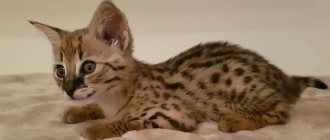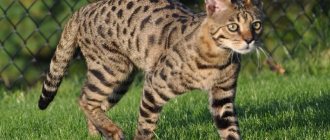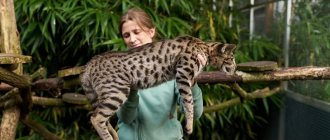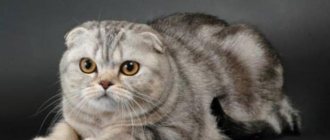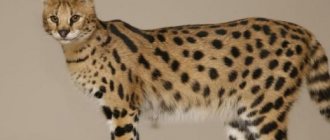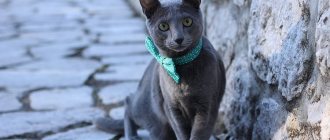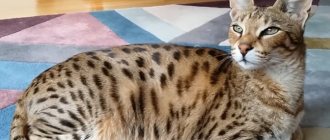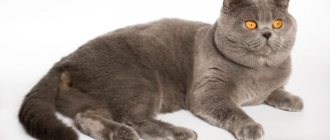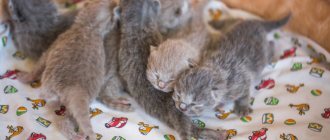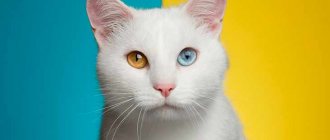Experiments on crossing a serval and a domestic cat took place at the cat farm of breeder Judy Frank in the United States in the early 1980s. The first viable kitten was born in 1986, he was named Savannah, and thus the name of the breed was born. To understand what genes the Savannah big cat breed has inherited, let us describe the characteristics of the serval. This is a fairly large cat, its body length reaches 135 cm, it looks like a cheetah, it has a spotted color, a small head and disproportionately large ears, like locators. The serval is an excellent hunter, jumps high, up to 3 meters in height, loves and knows how to swim. DescriptionCharacterCareFoodCost
Description of the breed
If you value exclusivity and chic, then the Savannah cat breed is for you; it is one of the most expensive breeds. Having a big Savannah cat in your home will emphasize your status and wealth, because this cat breed belongs to the VIP class. The Savannah has a “wild” appearance inherited from its wild parent, the Serval. This is a wild cat living in Africa, hence the name of the Savannah breed, which reflects the origin of cats, the blood of cats of the black continent flows in their veins. In breeding experiments, servals were bred with domestic Bengal cats, Siamese, Orientals, and Egyptian Mau. However, today, to strengthen the breed, it is bred only with Bengals. Bengal cats are distinguished by a large head, wide neck, long body, large eyes, small ears, medium-sized paws, short but thick hair. The characteristics of Savannah cats are distinguished primarily by their very large size; they are noticeably different from domestic cats, because at the withers they can be up to 60 cm. The weight of Savannah cats is from 7 to 15 kg. The body and legs are long, large ears are from a serval.
If you are ready to purchase the most affectionate, intelligent, responsive, active pet, then the Savannah cattery will be the most suitable place to implement this decision.
Characteristics of Savannah
A large but very active animal will become everyone’s favorite from the first days of its appearance in the house. This is a very affectionate animal, which has an incredible ability to be in the center of all events in home life. A curious cat will accompany his beloved owner not only in an apartment or house, but will also happily go for a walk around the yard and on a longer trip.
The idea of buying a Savannah kitten will be an excellent solution for all cat lovers and even for those who are somewhat wary of them. The loyalty and devotion of this breed simply has no boundaries.
Where can I buy?
The Savannah Victory nursery will help you find a loyal and affectionate friend . Here they have been breeding this breed for quite a long time to gain the necessary experience and connections, to raise the most intelligent, well-mannered and talented pets.
Buying a Savannah kitten in our nursery means acquiring a faithful friend with a good pedigree and impeccable documents. In addition, the Savannah cattery will provide a small dowry and qualified advice to future owners of charming kittens, who will very soon evoke the tender love of all family members.
Why Victory?
Victory means Victory. And we do everything to defeat our competitors in a fair fight.
The Savannah Victory nursery will be the best place to purchase kittens of this exotic breed for Russia.
We have all the necessary permits and carry out all the required tests on time.
We are also in love with each of our kittens and want our customers to share this love with us. Therefore, each kitten is raised by experienced specialists who prepare the baby for life outside the walls of the nursery. The cattery's kittens are delivered fully socialized. They have received all age-required vaccinations.
Having purchased a Savannah kitten from the Victory nursery, the buyer receives a full set of necessary documents: birth certificate, veterinary passport and pedigree.
The Savannah Victory nursery does not abandon its pupils and their owners even after a sad but necessary parting. Our clients can always get professional help from nursery staff or a veterinarian.
We are engaged in breeding and raising the most unique kittens, which will become our customers' most loyal friends, companions in games and on vacation, purring warmers and mood improvers.
With the kittens from the Victory nursery, owners will not have problems with the kitten’s toilet, feeding, or using a scratching post.
Our students are completely ready to give people boundless love and tenderness, playfulness and devotion.
Care
Savannah requires a large space, this is explained not only by the large size of the cat, but also by its needs for daily walks and an active lifestyle. The wild blood of the savanna requires long stays outside, in the fresh air, in the natural environment. In this regard, they are somewhat reminiscent of dogs, which also need to be walked on a daily basis. When deciding to buy a savannah, take into account these cat needs and see if you can satisfy them. Will the pet be tossing around in a closed space for days on end? Is the room for keeping this cat cramped? It is also necessary to provide regular water treatments; the savannah has inherited the genes of the serval, which often settles near bodies of water and loves to swim. Therefore, pamper your savannah with frequent baths and games in the bathtub. But otherwise, savannahs do not require complex care. She needs to be vaccinated and brought in for periodic veterinary checkups like any other pet.
Breeding and care
Descendants from crossing servals with domestic shorthair cats, Bengal, Siamese, Egyptian Mau and others are designated F1 (that is, descendants of the first generation). They have 53% blood of wild servals. All males, up to the fourth generation, are sterile. Each subsequent generation is designated by the F indicator with the corresponding numerical index. The descendants of F2 have only 29% Serval blood, and so on down the line, down to F7. The higher the percentage of Serval blood in the descendant, the more similar in appearance it will be to him. Savannahs designated F1-F3 are descendants of earlier generations. For them, the percentage of Serval blood is indicated in parentheses after the generation designation. They are the ones most valued by breeders of the breed and those wishing to acquire kittens.
To overcome physiological and behavioral problems, partners selected for mating are kept together from childhood. Significant biological differences between breeding breeds also affect the bearing of offspring.
This breed is unpretentious. Savannahs do not require special care. You just need to brush them regularly. It is advisable to equip a special enclosure, spacious enough, with equipment for climbing and jumping. The enclosure should only be used for its intended purpose—for cat walks. But in no case for permanent stay, since they value freedom of movement and will not tolerate confinement.
Cat breeds
Did you think you knew everything about cat breeds? Test your knowledge on the official website of German natural pet food Bosch. We present an extensive catalog of various cat breeds. The section contains more than 70 reference articles. The names of cat breeds with detailed descriptions and high-quality photos will be of interest to both experienced cat lovers and those who are just thinking about buying an animal.
If you do not want to search alphabetically, write the desired cat breed and use the search bar. Each description of cats with photographs is divided into several parts: a brief information about the breeding of the breed, then a detailed description of the physiological characteristics - for example, the shape of the head, ears and eyes, the size of the body, the nature of the color, the length of the coat, etc.
History of the origin of the breed
The origin of the Savannah is unusual, it belongs to the category of short-haired cats, the color of its coat resembles that of a cheetah. The rare features of these cats are explained by their exotic origin. The birth of the breed is usually dated back to the mid-80s of the twentieth century. Breeders from the USA set out to create a completely new breed of large domestic cats that look like cheetahs. Mainly due to the spotty coloration. For this purpose, attempts were made to cross Servals, wild African cats, distant relatives of the lynx, with a characteristic vertical ear arrangement, with domestic cats, Siamese, Bengal, Egyptian Mau and some other short-haired breeds. The serval was chosen as one of the parents not only for its bright appearance, but also for its intelligence, training, and friendliness.
The breeders have done a truly tremendous job. Even the selection of cats for mating in this case is difficult, not to mention the process itself. Representatives of the selected breeds differed greatly in size and temperament.
We recommend reading the article about servals on the Mister Cat portal.
On April 7, 1986, thanks to the efforts of D. Frank, the first pair of kittens was born. The breed standards, which were approved by TICA, were developed by breeders J. Sroufe and P. Kelly. TICA officially recognized the savannah in 2001.
It is interesting that the breed is still not recognized by other organizations of felinologists. It is believed that not enough time has passed for its signs to consolidate; they are unstable in manifestation and the number of savannahs is still small.
Descriptions, photographs and character
For future owners of graceful creatures, the section on the character of various breeds of cats and kittens will be extremely useful. Here you can find out how your pet tends to communicate with people - affectionate and trusting or emphatically independent and even sometimes aggressive? Or perhaps kittens are future excellent hunters, playful and curious, which means it will be impossible to lock the warlike tailed one within four walls. A detailed description of the breed will help you make the right choice. We especially note that the catalog contains expensive and rare cat breeds.
Often the determining factor when choosing a pet is its appearance. Especially if you entrust the choice of a pet to children. But when looking at photos of cat breeds, do not forget that only a careful acquaintance with the description of the character can serve as a guarantee that in the future there will be no disagreements between you and a tailed family member.
Character
Character is influenced by 3 main factors: parental behavior, generation, socialization. Since the breed is still at an early stage of development, animals of different generations differ significantly in character.
The first generation Savannah cat (F1 or F2) will behave more actively and even wildly. This is reflected in the nature of servals, which are characterized by jumping, hunting and tracking. Fertile F5 and F6 cats are already used for breeding. The resulting offspring has a character more familiar to all owners of domestic cats. But, nevertheless, all generations are characterized by excessive curiosity and high activity.
An interesting combination of love of freedom and easy-going characterizes all cats of the Savannah breed.
They adapt well to various conditions, show interest in things around them, and tolerate coexistence with other pets.
These cats are extremely mobile, jumping, and require a lot of space for a comfortable life. Unlike other cats, they are not only not afraid of water, but enjoy bathing. They even prefer to drink ordinary water from large containers, which apparently remind them of the reservoirs familiar to their ancestors. These cats do not protest when they are walked on a leash, which once again demonstrates their “dog-like” character.
The main characteristic is devotion, which is often compared to that of a dog. Wagging the tail as a greeting is also more of a dog than a cat sign.
Such cats get along with children from 5 years old (but not with toddlers), because they are calm and enjoy playing for hours on end. They have a high level of intelligence (some felinologists highlight this trait significantly) and are trainable. But they also require a lot of attention.
When raising them, it is important to take into account that they need early socialization. Kittens that communicate with people from their first days quickly get used to life in a family, learn behavior and habits. But in one litter there can be both more active and sociable kittens and more timid ones. Therefore, you need to communicate with the latter, play more actively, and encourage them more often than active, fearless kittens.
